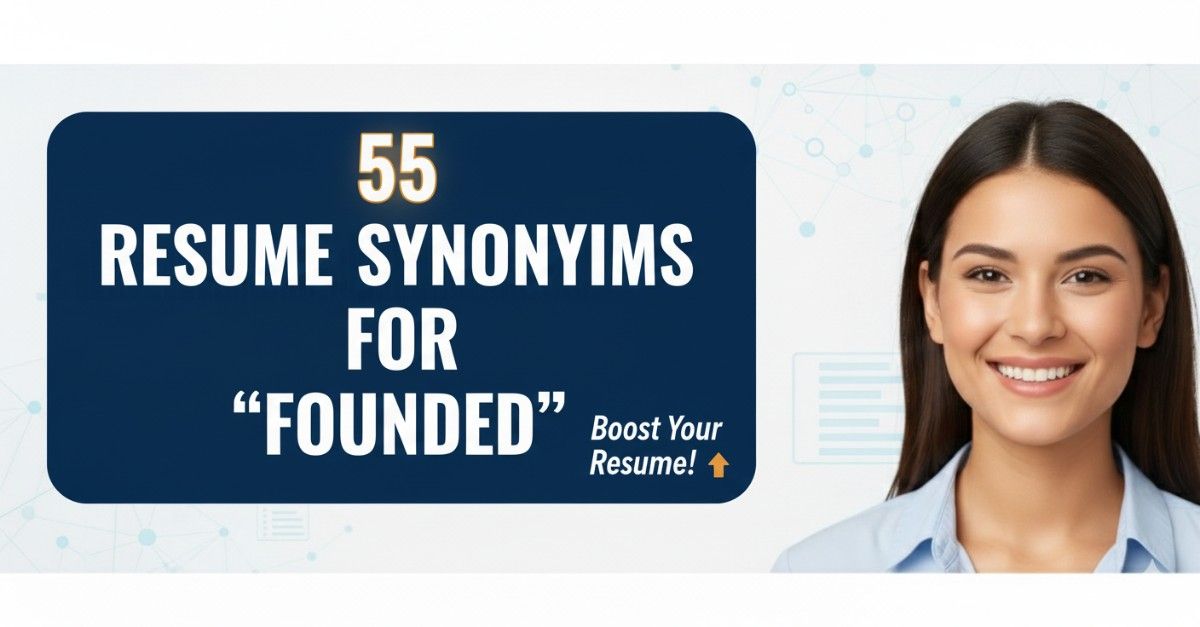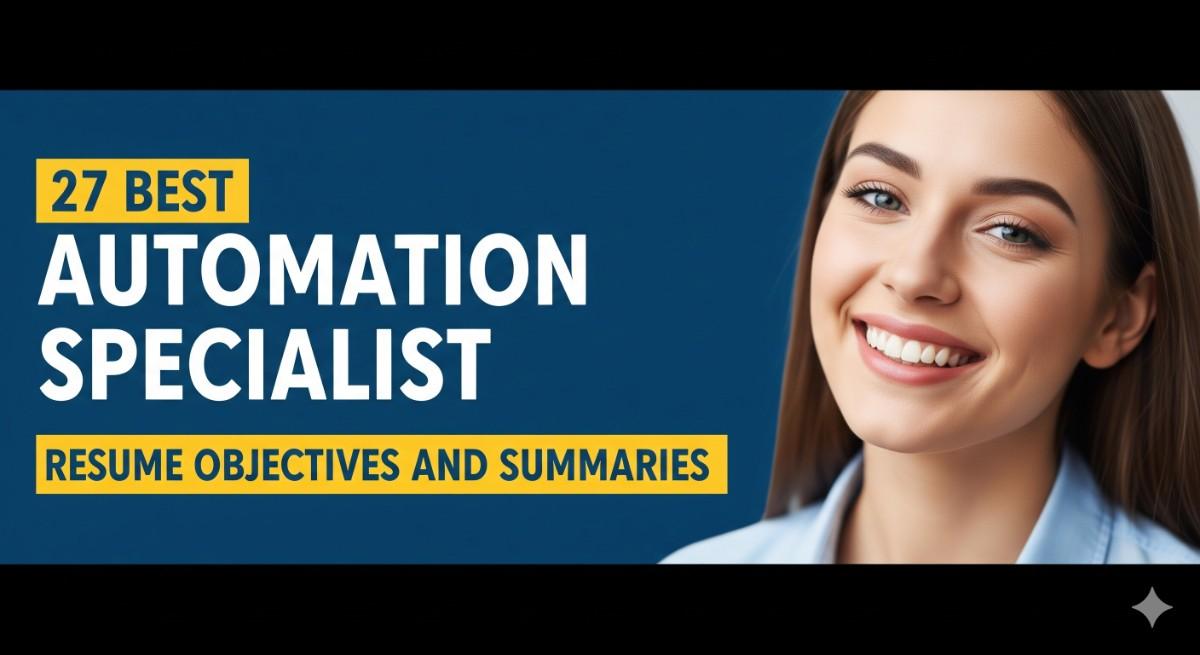
55 Resume Synonyms for Tailored To Use On Your Resume
Using the word “tailored” on resumes has become a common practice, yet its overuse can dilute its impact. When every candidate claims their experiences are “tailored” to the job, it raises questions about originality and creativity. In a competitive job market, where first impressions are crucial, repetitive language signals a lack of nuanced skills and fails to capture the candidate’s unique contributions. This is where the importance of varied vocabulary comes into play. By incorporating synonyms and alternative phrases, job seekers can not only stand out but also articulate their qualifications more effectively. This comprehensive guide will delve into the art of resume optimization, offering strategies for selecting impactful synonyms that resonate with hiring managers and Applicant Tracking Systems (ATS). We will explore the significance of word choice, provide examples of effective language variations, and highlight best practices for creating a compelling narrative that showcases your strengths without falling back on clichés. Embrace the power of language to elevate your resume and make a lasting impression.
- Why Synonyms for “Tailored” Matter on Your Resume
- The Complete List: 55 Resume Synonyms for Tailored
- Strategic Synonym Selection by Industry
- Power Combinations: Advanced Synonym Usage
- Common Mistakes to Avoid
- Quantification Strategies for Maximum Impact
- Industry-Specific Example Sentences
- Advanced ATS Optimization Techniques
- Tailoring Synonyms to Career Level
- The Psychology of Leadership Language
- Final Best Practices
- Key Takeaways for Strategic Synonym Usage
- Frequently Asked Questions
- How many different synonyms should I use in one resume?
- Can I use the same synonym multiple times if it fits different contexts?
- Should I always replace ‘Tailored’ with a synonym?
- How do I know which synonym is most appropriate for my industry?
- Do synonyms really make a difference in getting interviews?
- Related Resume Synonym Guides
Why Synonyms for “Tailored” Matter on Your Resume
Using synonyms for ‘Tailored’ on resumes is crucial for several reasons. First, the frequent use of the term—appearing on approximately 70% of professional resumes—can lead to monotony and predictability, making your application less memorable. This repetitiveness can also result in missed specificity; generic language fails to convey the unique qualities of your experience and skills. Additionally, over-reliance on a single term can reduce your impact, making it harder for hiring managers to grasp the depth of your qualifications. Employing a variety of synonyms not only enhances ATS optimization, as it allows for better keyword alignment with job descriptions, but it also creates dynamic narratives. This variety showcases your adaptability and creativity, ultimately helping you stand out in a competitive job market. By diversifying your language, you engage readers more effectively and present a more compelling case for your candidacy.
The Complete List: 55 Resume Synonyms for Tailored
Here’s our comprehensive collection of “Tailored” alternatives, organized for easy reference:
| Synonym | Best Context | Professional Level |
|---|---|---|
| Customized | Project management | Mid-level |
| Personalized | Customer service | Entry-level |
| Adapted | Team leadership | Senior |
| Modified | Strategic planning | Mid-level |
| Fine-tuned | Quality assurance | Senior |
| Adjusted | Product development | Entry-level |
| Refined | Marketing strategy | Senior |
| Enhanced | Sales initiatives | Mid-level |
| Optimized | Process improvement | Executive |
| Specialized | Technical support | Mid-level |
| Engineered | Systems design | Senior |
| Configured | IT solutions | Mid-level |
| Crafted | Content creation | Entry-level |
| Tweaked | Data analysis | Entry-level |
| Developed | Training programs | Senior |
| Constructed | Project frameworks | Mid-level |
| Designed | User experience | Senior |
| Personalized | Client onboarding | Entry-level |
| Aligned | Business objectives | Executive |
| Focused | Market analysis | Mid-level |
| Curated | Product selection | Mid-level |
| Shaped | Corporate strategy | Executive |
| Formulated | Policy development | Senior |
| Planned | Event coordination | Entry-level |
| Engineered | Solutions architecture | Senior |
| Developed | Business proposals | Mid-level |
| Specified | Job descriptions | Mid-level |
| Organized | Team projects | Entry-level |
| Executed | Marketing campaigns | Senior |
| Directed | Creative processes | Executive |
| Implemented | Operational strategies | Senior |
| Revised | Policies and procedures | Mid-level |
| Facilitated | Workshops | Mid-level |
| Tailored | Employee training | Senior |
| Crafted | Sales pitches | Entry-level |
| Customized | Software applications | Senior |
| Personalized | Customer experiences | Mid-level |
| Adjusted | Financial plans | Senior |
| Focused | Performance metrics | Mid-level |
| Refined | Product features | Senior |
| Aligned | Team goals | Mid-level |
| Modulated | Work schedules | Entry-level |
| Honed | Skills training | Mid-level |
| Directed | Strategic initiatives | Executive |
| Shaped | Company culture | Senior |
| Crafted | Brand messaging | Mid-level |
| Formulated | Innovation strategies | Executive |
| Engineered | Operational workflows | Senior |
| Specified | Requirements gathering | Mid-level |
| Developed | Business models | Senior |
| Optimized | Resource allocation | Executive |
| Customized | Client solutions | Senior |
| Enhanced | Product offerings | Mid-level |
Build your resume in just 5 minutes with AI.

Strategic Synonym Selection by Industry
- Technology: In this fast-paced industry, terms that highlight innovation and agility are critical. Preferred synonyms include:
- Innovation: Reflects the emphasis on cutting-edge solutions.
- Agility: Indicates responsiveness to change and adaptability.
- Integration: Suggests seamless collaboration of systems and processes.
- Healthcare: This sector values terms that convey precision and collaboration. Effective synonyms include:
- Precision: Highlights the importance of accuracy in patient care.
- Collaboration: Emphasizes teamwork among healthcare professionals.
- Compassion: Reflects the human aspect of healthcare services.
- Finance: In finance, terms that denote analysis and strategy are vital. Useful synonyms comprise:
- Analytical: Indicates a focus on data-driven decision-making.
- Strategic: Suggests long-term planning and foresight.
- Risk Management: Highlights the importance of mitigating financial risks.
- Consulting: This industry thrives on problem-solving and insight. Key synonyms include:
- Advisory: Denotes providing expert guidance to clients.
- Insightful: Suggests deep understanding and valuable recommendations.
- Facilitation: Highlights the importance of guiding discussions and processes.
- Manufacturing: In manufacturing, efficiency and quality are paramount. Preferred synonyms are:
- Efficiency: Emphasizes streamlined processes and productivity.
- Quality Assurance: Indicates commitment to high standards and reliability.
- Lean: Reflects a focus on minimizing waste while maximizing value.
Power Combinations: Advanced Synonym Usage
Advanced synonym usage is crucial for crafting a compelling resume. Utilizing power combinations of synonyms can enhance your narrative and improve the overall impression of your qualifications.
Showcasing career advancement can be done through increasingly sophisticated synonyms. For instance, instead of stating “managed a team,” you might say “spearheaded a cross-functional team,” which conveys leadership and initiative. Another example is replacing “helped improve sales” with “drove revenue growth,” highlighting a proactive role in the achievement.
When transitioning industries, synonyms can help translate your experience effectively. For instance, if moving from education to corporate training, rather than “taught classes,” specify “facilitated professional development workshops.” This not only emphasizes your teaching skills but also aligns them with corporate terminology.
Choosing synonyms that fit the situation is crucial. For example, in a tech role, use “engineered solutions” rather than “created solutions” to resonate with industry jargon. Similarly, in a marketing context, refer to “curated campaigns” instead of “designed campaigns” to reflect a more strategic approach.
Common Mistakes to Avoid
When incorporating synonyms for “tailored” in your resume, it’s crucial to avoid common mistakes that can undermine your message.
As a project manager, I tailored every aspect of the project to meet client specifications and tailored the team’s workflow for maximum efficiency.
As a project manager, I customized the project plan to meet client specifications and optimized the team’s workflow for maximum efficiency.
I tailored the marketing strategy to appeal to diverse demographics.
I adapted the marketing strategy to appeal to diverse demographics.
In my last job, I tailored the training program. In my previous role, I tailored the onboarding process.
In my last job, I customized the training program. In my previous role, I developed the onboarding process.
Quantification Strategies for Maximum Impact
- Team-Focused Synonyms:
When using terms like “led” or “managed,” accompany them with quantifiable details such as the number of team members, duration of leadership, and specific outcomes. For example: “Led a team of 10 over 12 months, resulting in a 25% increase in productivity.”
- Project-Focused Synonyms:
For words like “oversaw,” ensure to include project value, timeline, and success metrics. For instance: “Oversaw a $500K project that was completed two weeks ahead of schedule, achieving a 30% reduction in costs.”
- Strategic-Focused Synonyms:
When using terms such as “developed” or “initiated,” provide before and after metrics to illustrate the impact scope. Example: “Developed a new marketing strategy that increased lead generation from 200 to 600 per month, enhancing revenue by 40% within six months.”
Industry-Specific Example Sentences
- Developed customized software solutions that improved client satisfaction ratings by 30% within the first quarter of implementation.
- Engineered personalized user interfaces that increased engagement metrics by 25% across key demographics, enhancing overall user experience.
- Designed bespoke cloud infrastructure for a major client, resulting in a 40% reduction in operational costs and a 50% increase in system reliability.
- Implemented individualized care plans for patients, leading to a 20% decrease in hospital readmission rates over six months.
- Created specialized health programs that improved patient adherence to treatment protocols by 35%, significantly enhancing health outcomes.
- Developed tailored wellness initiatives for employees, resulting in a 15% increase in productivity and a 10% reduction in healthcare costs for the organization.
- Crafted personalized financial strategies that helped clients achieve a 50% increase in their investment returns over three years.
- Executed customized budgeting solutions for small businesses, leading to a 20% reduction in unnecessary expenditures and improved cash flow.
- Formulated bespoke market analysis reports that provided clients with actionable insights, resulting in a 15% growth in market share for their products.
- Designed individualized learning plans for students, resulting in a 40% increase in academic performance across diverse learning styles.
- Implemented customized training modules that improved teacher effectiveness ratings by 25%, fostering a more engaging classroom environment.
- Developed bespoke curriculum enhancements that aligned with state standards, leading to a 30% improvement in student test scores in core subjects.
Advanced ATS Optimization Techniques
To enhance your resume’s ATS optimization, consider implementing a keyword density strategy by using 2-3 different synonyms per job role. This not only diversifies your language but also helps you avoid keyword stuffing. For instance, if you’re in marketing, use “marketing specialist,” “branding expert,” and “communications manager” to ensure broader keyword coverage.
Semantic clustering is another effective technique. Group related synonyms together to create a natural flow in your content. For example, if you’re in IT, cluster terms like “software engineer,” “developer,” and “programmer,” allowing the ATS to recognize your expertise across various roles.
Finally, job description matching is crucial. Carefully analyze job postings for similar synonyms and incorporate them into your resume. If a posting mentions “project management” and “task coordination,” use both terms to align your skills with what employers are seeking. This tailored approach enhances visibility in ATS scans and increases your chances of making it past the initial filters.
Tailoring Synonyms to Career Level
When tailoring your resume for different career levels, it’s essential to choose synonyms that resonate with the expectations of potential employers at each stage.
- Entry-Level Professionals: Focus on collaborative and learning-oriented synonyms such as “assisted,” “collaborated,” “supported,” “learned,” and “engaged.” These words convey a willingness to grow and work within a team, appealing to employers looking for fresh talent eager to contribute.
- Mid-Level Managers: Emphasize direct management and project leadership with terms like “led,” “managed,” “coordinated,” “oversaw,” and “executed.” These synonyms demonstrate responsibility and capability, showcasing your ability to handle projects and lead teams effectively.
- Senior Executives: Use strategic and transformational language such as “orchestrated,” “transformed,” “pioneered,” “visioned,” and “championed.” These terms reflect a high level of influence and decision-making, indicating that you can drive organizational change and strategy.
Choosing the right words not only aligns with the expectations of each career level but also influences how hiring managers perceive your fit for the role.
The Psychology of Leadership Language
The psychology of leadership language plays a crucial role in how hiring managers perceive candidates. Different synonyms can trigger distinct psychological responses, influencing their assessment of leadership qualities.
- Action-Oriented Words: Terms like “drive,” “achieve,” and “deliver” suggest a results-focused leadership style. Hiring managers often respond positively to such language, associating it with decisiveness and accountability.
- Collaborative Words: Words such as “partner,” “unite,” and “facilitate” indicate strong team-building skills. These terms resonate with organizations that prioritize collaboration and collective success.
- Innovation Words: Phrases like “develop,” “transform,” and “innovate” convey strategic thinking. Hiring managers looking for forward-thinking leaders are drawn to candidates who emphasize these qualities.
- Nurturing Words: Terms such as “mentor,” “support,” and “empower” reflect a focus on people development. Companies that value employee growth are likely to favor candidates who use this language.
Aligning synonyms with the company’s culture can enhance a candidate’s appeal by demonstrating a fitting leadership style.
Final Best Practices
To effectively use synonyms in your resume, adhere to the following best practices:
- The 60-Second Rule: Ensure your resume tells a compelling story within 60 seconds. Focus on impactful synonyms that enhance clarity and engagement. Highlight achievements using action-oriented language that captures attention quickly.
- The Mirror Test: Choose synonyms that resonate with your natural speaking style. Read your resume aloud; if something feels awkward or forced, consider rephrasing. Authenticity ensures that your voice shines through while still being strategic.
- The Peer Review: Have trusted colleagues or mentors review your synonym choices. They can provide insights on whether the language feels genuine and appropriate for your industry, helping you strike the right balance between professionalism and personality.
- Measuring Success: Track your application response rates to gauge the effectiveness of your synonym usage. If certain terms yield better results, refine your language accordingly, maintaining authenticity while optimizing for impact.

Build your resume in 5 minutes
Our resume builder is easy to use and will help you create a resume that is ATS-friendly and will stand out from the crowd.
Key Takeaways for Strategic Synonym Usage
- Utilize tailored synonyms to enhance clarity and specificity in your resume; consider using diverse resume templates to format these terms effectively.
- Leverage an AI resume builder to automatically suggest tailored synonyms that fit your industry, streamlining the resume creation process while maintaining a professional tone.
- Incorporate tailored synonyms that reflect your unique experiences, ensuring they align with the language used in relevant resume examples to resonate with hiring managers.
- Focus on context when selecting tailored synonyms, as this helps convey your qualifications more effectively within the structure of various resume templates.
- Research industry-specific terms and tailored synonyms to enhance your resume, making it stand out when compared to standard resume examples from peers.
- Regularly update your resume with tailored synonyms to reflect new skills and experiences, utilizing an AI resume builder to keep it relevant and impactful.
Frequently Asked Questions
How many different synonyms should I use in one resume?
It’s advisable to use 2-3 different synonyms for “tailored” throughout your resume. This variety not only enhances readability but also demonstrates your versatility in language. However, ensure that the synonyms you choose accurately convey the same meaning to maintain clarity. Overusing synonyms may confuse the reader or dilute the impact of your skills. Aim for a balanced approach, incorporating different terms in relevant sections like your summary, experience, and skills to create a more engaging and professional impression.
Can I use the same synonym multiple times if it fits different contexts?
Yes, you can use the same synonym multiple times in different contexts, especially if it aligns well with the specific responsibilities or achievements you’re describing. Consistency can help reinforce your key skills and messages. However, be mindful of avoiding redundancy. If the synonym feels repetitive, consider substituting it with another option to maintain variety and engagement. The goal is to convey your message clearly while keeping the reader interested in your qualifications.
Should I always replace ‘Tailored’ with a synonym?
No, you don’t always need to replace “tailored” with a synonym. If “tailored” effectively conveys your message and fits well within the context, it can remain in your resume. It’s crucial to evaluate the effectiveness of the word in each instance. If a synonym feels forced or alters the intended meaning, it’s better to stick with “tailored.” Use synonyms strategically to enhance your language and avoid redundancy, but ensure they genuinely fit the context and maintain clarity in your messaging.
How do I know which synonym is most appropriate for my industry?
To determine the most appropriate synonym for your industry, research the common terminology used in job descriptions, industry-specific articles, and professional networking platforms. Understanding the language prevalent in your field helps you select synonyms that resonate with hiring managers and align with industry expectations. Additionally, consider the nuances of each synonym; for example, “customized” may fit better in tech, while “bespoke” might be more suitable in creative industries. Tailoring your language to your audience enhances your credibility and relevance.
Do synonyms really make a difference in getting interviews?
Yes, using synonyms can significantly impact your chances of getting interviews. By incorporating diverse vocabulary, you can present yourself as a well-rounded candidate and demonstrate your attention to detail and communication skills. Synonyms can also help you align your resume with specific job descriptions, making it more likely to pass through Applicant Tracking Systems (ATS) and catch the eye of hiring managers. A thoughtfully crafted resume using appropriate synonyms showcases your qualifications and can make a memorable impression, increasing your interview opportunities.
Related Resume Synonym Guides
Exploring synonyms for commonly overused resume words can enhance your professional narrative. By strategically choosing varied language throughout your resume, you not only capture the attention of hiring managers but also effectively convey your unique skills and experiences, making your application stand out in a competitive job market.











